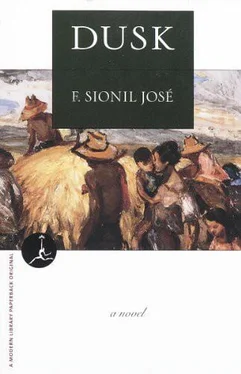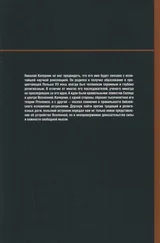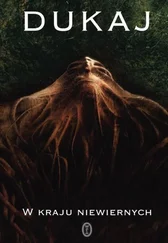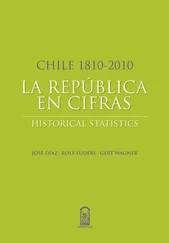Rest in peace, Istak intoned as An-no and Bit-tik lowered the wreath into the water. Bit-tik pushed it toward the middle, where the current was strong, and silently they watched it drift down the river. It was caught in a whirlpool briefly, then bobbed up and swiftly floated down the vast brown expanse. They watched it grow smaller, till it was no longer visible, hidden as it was by the flotsam from the mountains.
“We are orphans now,” Istak said, turning to his brothers. “Whatever may rile us, whatever differences we may have, we must be closer together. We have no one else.”
The farmers who gave them shelter in Carmay told Istak that in the town of Rosales they could get some help.
“You must go to Don Jacinto. Everyone knows him, for his big house is by the big balete tree. He is good — he will help you …”
They left Carmay at midday; the rain had eased somewhat. The sky was scabbed with gray clouds that scudded away and the sun came out in short shifts, full and bright upon a land now laved in green.
To their right, a straggle of trees and beyond the trees, farther in the distance, was the heavily forested mountain called Balungaw. Dalin told Istak of a village with the same name near the mountain, of a hot spring there where the sick often went. To their left was another creek which emptied into the Agno, and like the Agno, it was also swollen.
Shortly before nightfall, thatch-roofed houses with buri palm walls appeared on both sides of the narrow road. Pigs wallowed in side ditches. From under the houses, mangy dogs appeared and trailed and barked at the slow-moving carabaos . People went to the windows to look at the caravan, the palm-leaf canopies of the carts dark with rain, the solid wooden wheels caked with mud, and the new settlers walking beside their carts while inside were their women and children. They were in Rosales at last.
It was one of those new towns carved out of cogonal wastes and forests by settlers like them. As in most of the new towns that lined the road to the valley, its leading citizens were mestizos who were the favorites of the friars. Some took advantage of the recent opening of the colleges in Manila for Indios and went to the University of Santo Tomás to study law and medicine, and became infected, too, with the ideas of liberalism, that deadly contagion which the friars detested and ranted against. Large tracts of land toward the east, all the way to that prosperous village of Balungaw, to the very foothills of Mount Balungaw, were claimed by the first Spanish settler in this part of the country, but there were also equally large areas titled to the principalia —the educated men like Don Jacinto.
Since most of the settlers in this wild part of the country were Ilokanos, their new settlements were named after the towns they came from — Casanicolasan, Cabalawangan — or after the vegetation that abounded in the new land — Cabaletean (balete trees) or even Rosales itself, after the rosal bush which lined the roads and with the start of the rainy season had started to bloom with puffy white flowers. They brought with them not just implements from their old villages, but the attitudes of hard work and perseverance that had made them endure.
From Rosales, if they pushed onward to the south, it was to the towns of Nueva Ecija — Cuyapo, Gapan — most of them still surrounded by forests; and to the north, Santa Maria, Tayug; and onward to the Caraballo range, the new settlements of San Nicolas and Natividad. And to the east, Umingan, Lupao, then San José, the big town that was also a gateway to the valley, for beyond San José, up to the first mountain range that was a barrier to the valley, was the narrow trough of Santa Fe.
Like most of the new towns, Rosales had no municipal building except a ramshackle shed near the open market, where, sometimes, the health inspector conducted what little official duties he had. There was no telegraph as yet in this part of the country, no Spanish official. The priest in the new church was Indio, for the Spanish friars usually stayed in the bigger communities where their quarters were more comfortable and their meals more nourishing. Civic order was imposed traditionally by a member of the principalia , and in Rosales, this authority was vested in Don Jacinto, who was not only rich but also educated.
His house stood prominently in the middle of the town, and from there he dispensed patronage, and like the Indio priest, was revered for his many acts of kindness to his tenants and those wayfaring strangers passing through. It was a big house roofed with tile, and its wide yard was dominated by a balete tree, massive and brooding, a perpetual abode of spirits and endowed with an awesome talisman. Its trunk was three, even four times the size of a cartwheel, larger than any of the forest trees they had passed. The thick veins coiled around it, fat as pythons, thrust upward and merged with each other, forming a mantle, a pall, of vivid green.
Across the plaza was the small wooden church with a grass roof. Istak could put on the soutane and say Mass now for Ba-ac, for Mayang, but he was not a priest, he was not going to be a priest. It was getting on toward evening and the Angelus should soon be tolled. The Indio priest who was pacing the churchyard walked to where the carts were unhitched in the shade of the balete tree and asked where they had come from. The Ilokos, An-no replied politely.
They were Ilokanos; they did not have to be told about the balete tree. In the evening before eating, they would make an offering of food to the spirits. In the old country and here, there were many things that could not be explained. One had to accept them without question, just as one welcomed the morning and recognized God.
Istak would go to Don Jacinto in the morning, tell him what had happened. The work animals were their most precious possessions; he would leave one of the carabaos if necessary so that they would not starve.
In the onrushing dusk, he glanced at his arms; they were sunburned. His palms were no longer soft — the few days’ work in Po-on, gathering firewood, feeding the carabaos , all that had callused his hands. And there would be harder work now that he would really be the farmer he was not meant to be.
No one but he could talk to Don Jacinto. There was not much that the Carmay farmers could tell him except that Don Jacinto had studied in Manila, and that he was rich — as all the few educated people were. He wondered how it would be when he would finally ask for help. Else they would have to eat banana pith and all those weeds meant for pigs.
He pitied Dalin most. She had known only tragedy, and she would be hungry, too. And only because she had elected to cast her lot with them. What more could a man want from a woman but this loyalty?
Morning stole into Rosales during the rainy season with little sun, but there was the pleasant odor of cooking fires, and the stirring of work animals. The farmers had to go to the sodden fields early to plow, to plant, to watch the seedlings. Then the sun rose, and the grass in the plaza shone; beyond the edge of the plaza were green hedges of rosal in bloom. Dalin had risen earlier and she had again gathered a few of the white blossoms and now, with the flowers in an empty pot, Istak drank the fragrance. She had taken a piece of black cloth, cut it into strips, and pinned it on the sleeves of the menfolk and on the blouses of the women. They could not afford black dresses to wear as emblems of their grief. They would wear these ribbons for a year, after which there would be a bakas , the ritual end of mourning.
Istak put on his best trousers and the white shirt that Mayang had woven. His clothes were now tight, but they were all he had.
He was asked by a servant to go up the staircase, so polished that the reddish narra grains shone. The house, though made of stone, was not as big as the houses in Vigan, nor as old; the brick sidings were new and no weeds sprouted from the tile roof as yet. The walls were painted with a lime wash, but with the oncoming rains, the wash had turned a dirty brown.
Читать дальше












